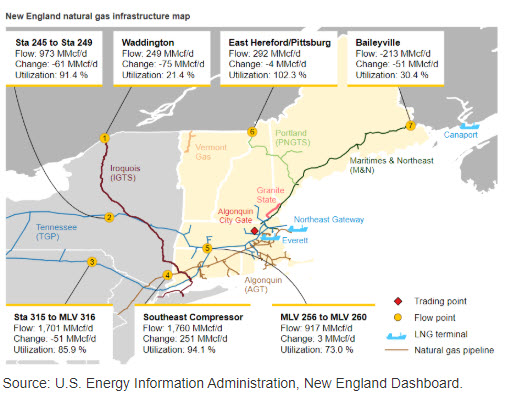Several natural gas pipeline upgrades are either planned or under construction in New England, which will increase deliverability into the region during the next several years. According to the U.S. Energy Administration’s (EIA) tracking of natural gas pipeline projects, four pipelines are expected to increase compression in their systems by 2023, adding more than 350 million cubic feet per day (MMcf/d) of natural gas pipeline capacity into the region.
As of the end of 2019, EIA estimates pipeline capacity into New England from both Canada and New York was 5,200 MMcf/d. During days of peak demand in the winter, most of this capacity is fully utilized, which can lead to spikes in spot natural gas prices and, in turn, wholesale electricity prices. These projects may help ease the pipeline constraints into New England. For example, average winter utilization on the Algonquin Gas Transmission pipeline near the New York and Connecticut border has averaged about 89% so far this winter (Nov 1, 2019—March 6, 2020). EIA’s New England Dashboard reports on daily utilization by pipeline (see map).

The largest of these pipeline upgrade projects, which submitted its application to the Federal Energy Regulatory Commission (FERC) on February 4, is Iroquois pipeline’s Iroquois Enhancement by Compression Project. By increasing the horsepower at three compression stations in New York and Connecticut, Iroquois pipeline will increase its capacity by 125 MMcf/d. The border crossing at Waddington in upstate New York, which connects to the TransCanada Mainline, is already designed to supply these additional volumes. If approved, the project is expected to start construction in spring 2023 and be placed in service by November of that year.
On the Portland Natural Gas Transmission System, two projects will increase the volumes of natural gas imports from Canada received from the TransQuébec and Martimes pipelines at Pittsburg, New Hampshire. These projects are the Portland Xpress Project Phase III, which will add 24 MMcf/d of capacity in 2020, and the Westbrook Xpress Project Phase II, which will add 63 MMcf/d of capacity after its expected completion in 2021. The previous phases of both projects have already entered service, and both projects only require modifications or upgrades at existing compressor stations.

- Algonquin’s Atlantic Bridge Phase II project will add 92.7 MMcf/d of additional capacity into New England when the Weymouth compressor station is completed in Massachusetts. The project, which has faced numerous delays, is expected to enter service either later in 2020 or in 2021.
- Tennessee Gas Pipeline’s Station 261 Upgrade Projects will provide an additional 72 MMcf/d of capacity. These projects are expected to enter service in 2020 and upgrade compressor station 261 and add 2.1 miles of looping or new pipeline laid parallel to the existing pipeline near the site.
[contextly_sidebar id=”lPrwBKottOQJNQENGI22GWjZ79GygM6u”]







